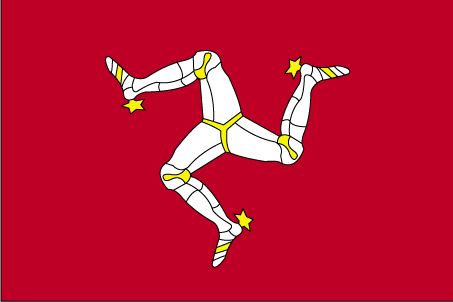
Anger at political inertia combined with a growing sense of the loss of national identity is proving a potent cocktail to awaken nationalism in young people on the Isle of Man
`Anger at political inertia combined with a growing sense of the loss of national identity is proving a potent cocktail to awaken nationalism in young people on the Isle of Man. The situation is compounded by politicians and a media which is `deaf in one ear' and an incompetent police force whose allegiance is to the English Crown not the Manx people.'
There has been a curious mix of nationalist expression on the Isle of Man over the last twelve months that indicate an eclectic range of forces are at work which may signal a difficult time for the Islands neo-colonial establishment going forward.
Last autumn slogans appeared across the Island calling for Manx freedom and also clearly linking the lack of progress towards its achievement to the dominance politically that the United Kingdom still retains over the Manx people.
Initially sporadic the daubing built up in ferocity until on one night alone slogans were daubed in almost every parish.
Authorities were caught on the back foot and even to a certain extent the established Nationalist Party was taken aback.
In the case of the authorities the Manx government assumed that the money it has thrown at language and cultural projects since the daubing and property burning of the late 1980s had effectively `bought-off' dissent and to a certain extent
it seemed that strategy had worked with some of the more dissenting voices from the past settled.
In the case of mainstream Nationalism it was clear we had underestimated the loathing with which some younger Manx people regarded the current status quo vis a vis the Isle of Man and the UK government. Police reaction to the new outbreak of direct action was swift but in its earlier stages amateurish and little progress was made.
Known nationalists were placed under surveillance and eventually this scrutiny was extended to those involved in the language movement with little political pedigree.
Police frustrations at their inability to catch the perpetrators eventually boiled over and a key meeting of senior figures eventually decided to deploy all resources available to catch the `graffiti artists'. Unfortunately by now the exasperation within the police had produced tensions of its own with some officers quietly questioning whether the Force was being politically manipulated and the use of resources was over the top. (Other officers simply quietly enjoyed the overtime for which no figure has ever been published.)
Eventually a number of arrests were made and after a series of behind the scenes arguments involving police, the attorney general's office and politicians the charges were quietly dropped.
Lately graffiti has started to appear again this time worryingly for the government in the heart of the Capital itself. The new message is less sophisticated and indeed perhaps even less political than the mix of Manx language and anti-colonial slogans which appeared six months ago. It says mbluntly Manx not English.
Coincidentally this new bluntness parallels a similar outburst of expressionism on the Internet which coincided but is clearly not coordinated with the graffiti campaigns. New web-sites calling for Independence have been complemented by less political but equally succinct calls for Manx identity to be respected.
Most recently a new Face book group is active calling for more 'Manx accents on Manx Radio'.
It is clear that a generation of younger people feel frustrated that their identity is being suppressed and the ability to express discontent over this is also via the main stream media being stifled.
Island Radio Stations including the so called 'Nations Station', Manx Radio, make no serious attempt to reflect nationalist feeling.
Indeed Manx Radio has gone even further adopting a partisan stance at the time of the graffiti campaign with the Islands Chief Constable 'bleating incessantly' on it's new bulletins abbot the graffiti 'criminals'.
It is ironic that just weeks after this display of bias the radio station itself finds itself in the firing line – poetic justice perhaps?
Where does all this leave nationalism on the Isle of Man? It is unclear how long-lived the current upsurge will be but for the present it seems stronger.
Note: The above article is a précis of events on Mannin over the past twelve months articles and comment on the specific events can be found on the Celtic League News site at:
http://groups.yahoo.com/group/celtic_league/Other sites referred to can be found on Face book
This article appears in the autumn issue (No 147) of the Celtic League journal CARN. A further Manx language article on the graffiti episode is also published in this issue
J B Moffatt (Mr)
Director of Information
Celtic League
09/09/10

Commentaires (0)
Aucun commentaire pour le moment. Soyez le premier à réagir !